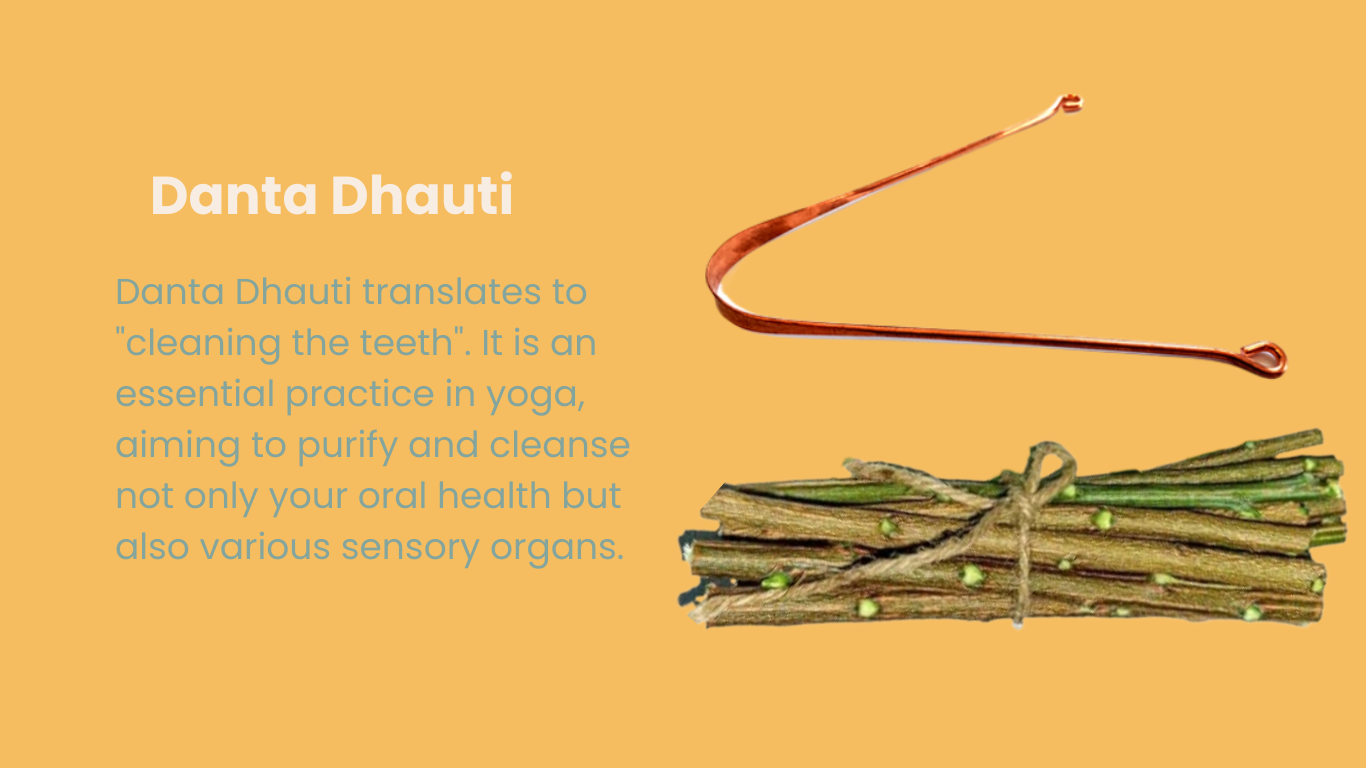Danta Dhauti in Hatha Yoga for Cleansing and Rejuvenation
Danta Dhauti: Cleansing and Rejuvenating Your Sense Organs in Yoga
Danta Dhauti translates to "cleaning the teeth". It is an essential practice in yoga, aiming to purify and cleanse not only your oral health but also various sensory organs. It is a yogic practice deeply rooted in traditional yoga and encompasses the cleansing of key sensory organs, including teeth, tongue, ears, and the top of the head. This allows us to perceive the world with all senses. Rooted in ancient yogic texts like the Gheranda Samhita, this practice emphasizes maintaining oral hygiene and awakening higher awareness through these cleansing rituals.
Dantamoola Dhauti: Nurturing Dental Health
Modern toothbrushes clean teeth, but what about the gums? The gums play an important role int dental health. They provide a protective layer around the teeth. Without them bacteria and food would find their way into the deeper parts of your teeth, negatively impacting your teeth health.
Dhauti Technique
-
Preparation: Gather dried khadira (catechu) leaves or pure black/yellow clay (as an alternative).
-
Create a Fine Powder: Grind khadira leaves into a fine powder, ensuring it's not too coarse.
-
Juice Extraction: Soak khadira leaves to extract their juice.
-
-
Application: Apply the juice or the powder to your index finger.
-
Massage: Gently massage your tooth roots with the juice- or powder covered finger for 2-3 minutes.
-
Gargle: Finish by gargling with water, repeating this process 5-6 times.
Alternatively, use a paste made from pure black or yellow clay if Khadira is not available.
Ayurveda - the ancient healing system of India - uses the medicinal herb catechu. Sucking catechu is advised if there is gum swelling, oral blisters, pain, decay, or bacteria. Catechu has been used for thousands of years to safeguard teeth.
Benefits of Dantamoola Dhauti
-
Maintains strong blood flow in the gums and healthy teeth.
-
Helps prevent premature tooth loss and minimizes dental disorders.
-
Aids overall body health by preventing bacterial development and cardiovascular issues due to oral problems.
Jihva Shodhana: Purifying the Tongue
In acupressure and acupuncture the tongue is considered to be the mirror of the body and it refflects or overall health. As a result of metabolic processed our tongue collects waste materials and Jihva Dhauti can be used to remove these toxins.
Dhauti technique
-
Tongue Cleaning: Start by gently scraping your tongue with your first three fingers, from root to tip.
-
Tongue Buttering: Apply a thin layer of ghee or another suitable oil to your tongue.
-
Massage: Using your thumb and fingers, gently massage and squeeze your tongue's sides.
-
Tongue Stretching: Gradually stretch your tongue with clean iron tongs or your thumb and index finger. Repeat daily 2-3 times.
Benefits of Jihva Shodhana
-
Assists in maintaining oral hygiene and avoiding bad breath.
-
Improves the sense of taste, enhancing the enjoyment of food.
-
Stimulates organs related to the tongue, aiding digestion and gastrointestinal health.
-
The massage of tongue will help you speak more clearly and can be used in the therapy of stuttering
Fun fact: According to a legend, a yoga practitioner's tongue should extend all the way to the center of their eyebrows, or at the very least, their nostril's tip.
Karanrandhar Dhauti: Ear Cleansing for Well-being
Say goodbye to cotton buds and the risk of damaging your ear drum. The external ear resembles a structure of a conch. Connecting to the brain through a canal extending from the external ear, the inner ear has glands responsible for producing earwax and is lined with fine hairs. The delicate hairs in the ears trap any foreign objects that make their way inside the ear covering them with earwax for removal. This unique structure shields the hearing system of the ear.
The purpose of Karanrandhar Dhauti is to maintain the health of the ears and it can also be used to improve hearing so that inner sounds can be heard. The hearing sense is capable of picking up both subtle internal sounds and sounds created externally. During the practice of nada Yoga the practitioner pays attention to bodily sounds produced by the breath, heartbeat, blood circulation, etc. When listening to them, one enters a level of consciousness where many sounds can be heard.
Dhauti Technique:
-
Wet Fingers: Begin by moistening your index or ring finger.
-
Gentle Insertion: Slowly and gently insert the moistened finger into the ear canal's opening.
-
Circular Motion: Rotate your finger in a circular motion to create a vacuum-like action, removing debris and wax.
-
Optional: If a vacuum-like action isn't achieved, use a few drops of edible oil to soften the wax. Repeat as needed.
Benefits of Karanrandhar Dhauti:
-
Improves blood flow to maintain ear health.
-
Safely removes dirt and wax from the ear canal.
-
Enhances hearing abilities over time.
-
Reduces the risk of common ear issues such as colds, coughs, sinusitis, and rhinitis.
Kapalarandhra Dhauti: Awakening the Third Eye
This technique in achieving higher awareness and divya drishti, divine vision, by focusing on the point between your eyebrows the Ajna Chakra. The kapalarandhara, also known as the brahmarandhara, is the doorway to higher awareness at the sahasrara chakra.
Dhauti Technique:
-
Sit Comfortably: Find a comfortable seated position for meditation.
-
Forehead Massage: Close your eyes and gently massage the area just above your nose (Ajna Chakra) with your right thumb.
-
Water Technique: Alternatively, wet your palm and pat the upper head (forehead) a four to five times to dampen the area.
-
Massage Continuously: Massage the area with your palm or fingers, focusing on the forehead's central region.
-
Repeat: Perform this technique upon waking up, after midday meals, and before bedtime.
Benefits of Kapalarandhra Dhauti
-
Clears mucus obstructions from sinuses and nasal cavities.
-
Boosts immunity against common illnesses like colds, coughs, sinusitis, and rhinitis.
-
Supports eye health and awakens divya drishti, the divine vision.
-
Promotes a sense of coolness, freshness, alertness, and mental versatility.
The significance of maintaining healthy sense organs
Sensory Perception
Yoga is not just about physical postures but also about cultivating awareness and heightened sensory perception. The sense organs—eyes, ears, nose, tongue, and skin—serve as the gateway to perceiving the external world. Maintaining their health ensures that practitioners can fully engage their senses during yoga practices, deepening their awareness of bodily sensations and surroundings.
Mind-Body Connection
Yoga seeks to harmonize the mind and body. The sense organs act as bridges between these two aspects of self. When the sense organs are clean and functioning optimally, the communication between mind and body becomes more efficient. This enhances the practitioner's ability to control their mental state, thoughts, and emotions during yoga and meditation
Concentration and Focus
A significant aspect of yoga practice involves concentration and focus. Whether it's concentrating on the breath during pranayama or focusing on a particular point in a meditation practice, healthy sense organs play a crucial role. Disturbances or discomfort in the sense organs can hinder concentration, making it difficult to achieve a meditative state.
Breath Awareness
The sense of smell plays a vital role in breath awareness practices like pranayama. A clean and unobstructed nasal passage is essential for proper breath control and awareness. When the nose is congested or unhealthy, it can impede the smooth flow of breath and hinder the practitioner's ability to engage in breath-focused practices effectively.
Digestive Health
The sense of taste is closely related to digestive health. A clean and well-functioning tongue is essential for savoring food and recognizing its flavors. Ayurveda suggests that a clean tongue is linked to improved digestion. Digestive health is crucial for yogis as it impacts the body's ability to assimilate nutrients and maintain overall vitality.
Incorporating these Danta Dhauti practices into your daily routine can provide profound benefits for your oral health, sensory organs, and overall well-being. These ancient techniques, designed to harmonize the body and mind, are a valuable addition to your yoga practice.

